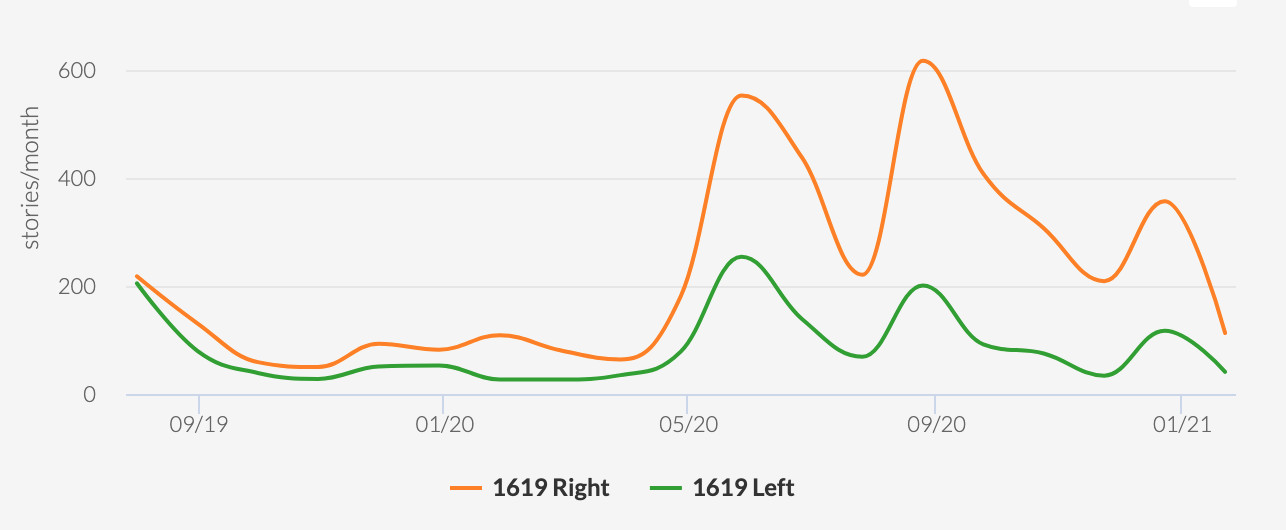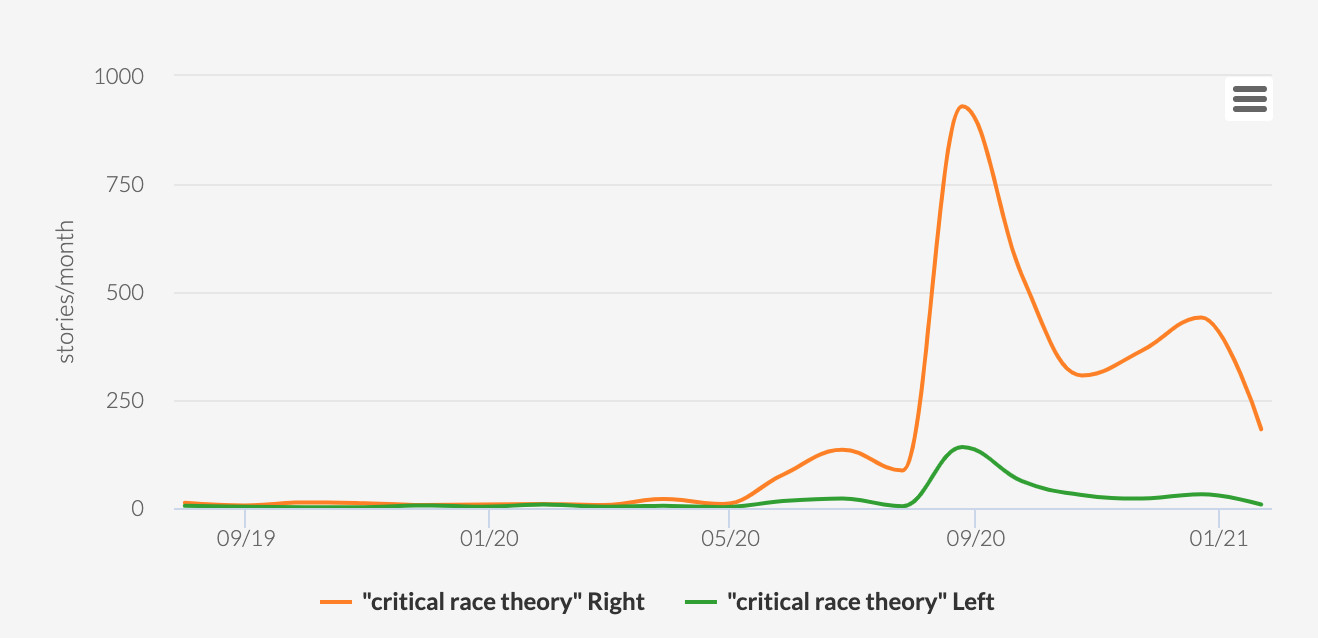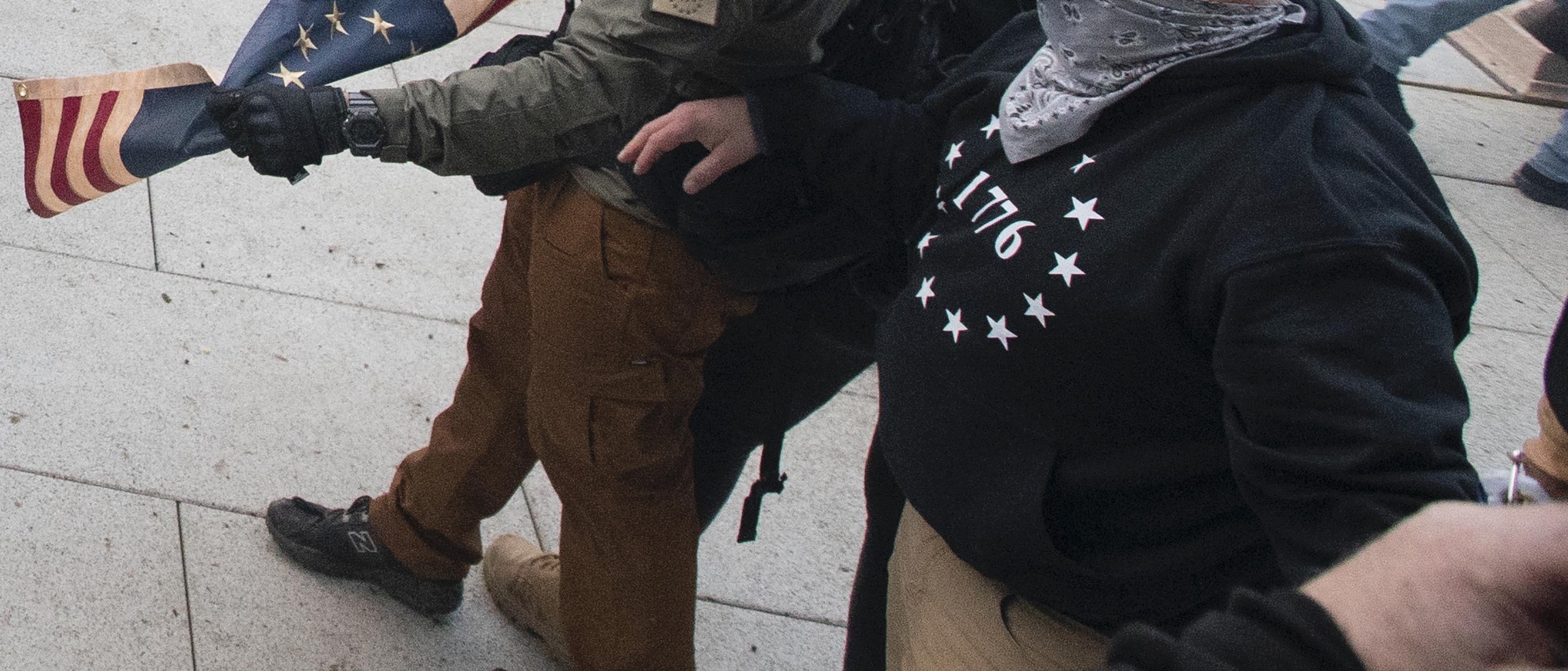Footage of the January 6 Capitol insurrection revealed hundreds of references to 1776—in signs and in speeches, on t-shirts and hats and stickers. “1776” was chanted in the Capitol halls by leading figures within the so-called alt-right, including some who had also participated in the racist riot in Charlottesville, Virginia, and by those who believed themselves participants in the dawn of the next American revolution. The Proud Boys, too, cite this date; they sell their merch through a store called 1776.
We are researchers of media manipulation and disinformation at the Harvard Kennedy School’s Shorenstein Center, and we wanted to know more about how “1776” became the battle cry of the insurrection. Our research reveals that the popularity of “1776” owes in part to keyword squatting—a tactic by which right-wing media have dominated the keywords “1619” and “critical race theory” and enabled a racialized disinformation campaign, waged by Trump and his acolytes, against Black civil rights gains.

“1776” on Google Trends. Screenshot via authors.
According to Google trends data for the past five years, “1776” showed an annual spike around July 4. But after the publication of The 1619 Project, the New York Times’ journalistic series that tells the history of Black Americans’ role in creating the nation, “1776” became a popular conservative rejoinder. In September 2020, Trump formed the 1776 Commission to support what he termed “patriotic education.” (The commission was part of a series of racist retaliations against Black civil rights organizing and educators pledging to teach a more comprehensive, diverse, and inclusive US history; Trump later signed an executive order banning “critical race theory” from federally funded organizations.) When he announced the commission, Trump explicitly targeted critical race theory and the 1619 Project, calling both “toxic propaganda—ideological poison that, if not removed, will dissolve the civic bonds that tie us together.”
On January 18, 2021—Martin Luther King Jr. Day—Trump released “The 1776 Report,” a long screed meant to wipe away academic and journalistic efforts to reconcile American’s history of violence, displacement, and racial and ethnic trauma. The report recast the racist roots of American education; for instance, in the 1920s, the Ku Klux Klan promoted a public-school curriculum that emphasized “Americanizing” all “foreigners”—an effort, in part, to prevent Catholics and immigrant groups from establishing their own schools and curricula in non-English languages. Klan members ran successfully for school board positions across the country, popularizing the slogan of “America First”—a phrase which, coincidentally, featured prominently at this year’s Conservative Political Action Conference, and appears in the name of a far-right political action conference. The report fizzled in the wake of the Capitol riot; still, it’s an exemplary piece of racialized disinformation that claims to identify problems with contemporary American education, but often espouses color-blind racism by minimizing how racial inequalities shape educational outcomes in the US.
So, why was Trump so invested in retaliating against the 1619 Project? The project unsettled the education system’s dominant narratives. It pieced together the history of slavery in the US from the perspective of those who were enslaved. It brought into the present day the continuing consequences of slavery as well as the contributions of Black Americans over a 400-year period. It also offered a damning critique of whiteness as a social construct—one whose scope, over time, has broadened to include Germans, Greeks, Irish, Italians, and Spaniards to maintain structural barriers that keep power concentrated in the hands of a few. Teachers became excited about using materials from the project in their classrooms and began sharing curriculum online; recently, the Pulitzer Center announced a program called the 1619 Project Education Network to train educators in media literacy and racial justice.
For the right-wing, criticizing the project became a cause célébre, taken up by figures like New York Times Opinion columnist Bret Stephens, who termed 1619 a “failed” project, and Newt Gingrich, who remarked, during a “Fox and Friends” interview, “The whole project is a lie.” Nikole Hannah-Jones, a Times journalist who conceived of the project, endured racist harassment and death threats across social media.
As researchers, we wanted to assess the pervasiveness and tactics of racialized disinformation. Using Media Cloud, a tool created by MIT and Harvard for analyzing news, we compared coverage of “1619” by right-wing media (including The Federalist, Fox News, Daily Wire, and the National Review, among others) and left-wing media (including The Root, Daily Kos, Salon, and The Grio, among others) in the US. According to our analysis, right-wing media wrote nearly three times as frequently about “1619” than the left-wing media did. Similarly, between September 2020 and February 2021, right-wing media covered “critical race theory” twice as frequently as left-wing media. This asymmetrical coverage is indicative of keyword squatting, a networked propaganda strategy that ensures the counter viewpoint is steadfastly tethered to these keywords across a range of platforms—including Reddit, YouTube, Facebook, and especially on the front page of Google Search.
Keyword squatting—defined by the Media Manipulation Casebook as the practice of “creating online content…around a specific search-engine-optimized term so as to dominate the search results of that term”—has been leveraged by right-wing media to extend the duration of attention to propaganda campaigns, including those linked to controversial keywords like “antifa” or “the caravan.” And it works: Google’s top news stories on “critical race theory” reflect ongoing bombastic headlines, like “Chinese Americans mobilize against critical race theory,” from Fox News, or “Critical Race Theory is Indoctrination, not History,” from Real Clear Politics. Likewise, searching for “1619” on YouTube returns a video from conservative outlet PragerU titled, “What’s wrong with the 1619 project?”

Media Cloud analysis of “1619” coverage. Screenshot via authors.

Media Cloud analysis of “Critical Race Theory” coverage. Screenshot via authors.
Had Trump won reelection, his 1776 Report would have been called up by conservatives as an “authoritative” source on America’s founding—as if the thousands of history books, written from the perspectives of white people, were not enough. Instead, Trump lost the election. Within hours of taking office, Biden’s team removed the 1776 Report from the active White House website. (It remains on the archived site of the Trump administration.) In search engines, the report has been buried by the American Historical Association’s statement of condemnation.
Count this as a temporary win. It is not possible for our nation to move forward without repairing the damage of a history erased by slavery and denied by those who seek to rewrite US history. What makes a nation strong is not its ability to tell a unified story of its founding, but rather its efforts to grapple with the sum of us, so that we may forge our collective identity through self-determination—and so that we may realize our highest moral duty to fix this divided house.
Brandi Collins-Dexter and Joan Donovan are the authors. Collins-Dexter is senior research fellow at Harvard Kennedy School’s Shorenstein Center on Media, Politics, and Public Policy, and is the former campaign director at Color of Change. Donovan is the research director at Harvard Kennedy School’s Shorenstein Center on Media, Politics, and Public Policy.

